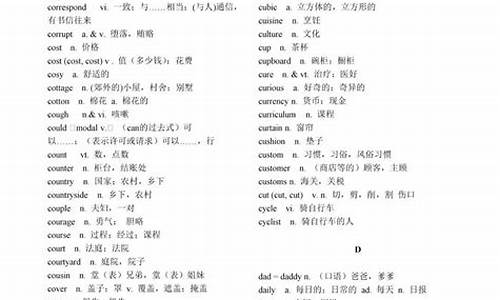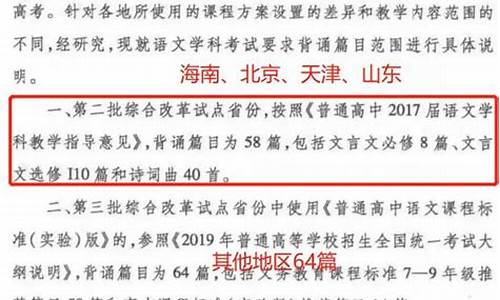您现在的位置是: 首页 > 高考调剂 高考调剂
2013年北京高考英语试卷解析_2013北京高考英语解析
tamoadmin 2024-05-15 人已围观
简介第一部分:听力理解(共三节,30分)第一节(共5小题;每小题1.5分,共7.5分)听下面5段对话或独白。每段对话或独白后有一道小题,从每题所给的A、B、C三个选项中选出最佳选项。听完每段对话或独白后,你将有10秒钟的时间来回答有关小题和阅读下一小题。每段对话或独白你将听一遍。例:What is the man going to read?A. A newspaperB. A magazineC.

第一部分:听力理解(共三节,30分)
第一节(共5小题;每小题1.5分,共7.5分)
听下面5段对话或独白。每段对话或独白后有一道小题,从每题所给的A、B、C三个选项中选出最佳选项。听完每段对话或独白后,你将有10秒钟的时间来回答有关小题和阅读下一小题。每段对话或独白你将听一遍。
例:What is the man going to read?
A. A newspaper
B. A magazine
C. A book
答案是A。
1. Who answered the phone?
A. Mike B. Henry C. Tom
2. What’s the woman’s favourite food?
A. Italian. B. Chinese. C. Indian
3. When does the first flight arrive in Detroit?
A. 5:18am. B.6:10am C.8:50am
4. What is the woman looking for?
A. Zoo B. Telephone C. Tennis court
5. What will the weather be like at the weekend?
A. Cloudy. B. Snowy. C. Sunny
第二节(共10小题,每小题1.5分,共15分)
听下面4段对话或独白,每段对话或独白后有几道小题,从每题所给的A、B、C三个选项中选出最佳选项。听每段对话或独白前,你将有5秒钟的时间阅读每小题。听完后,每小题将给出5秒钟的作答时间。每段对话或独白你将听两遍。
听第6段材料,回答第6至7题。
6. Where are the two speakers?
A. In the hotel B In a shop C. In a restaurant
7. How much did the man pay in the end?
A. $115. B. $130 C. $140
听第7段材料,回答第8至9题。
8. What did the man do last weekend?
A. Watched TV. B. Stayed at home. C. Visited a friend
9. What will the woman probably do this weekend?
A. Play tennis. B. Do some shopping C. Go to a dance
听第8段材料,回答第10至12题。
10. Where are the new houses?
A. On the main road. B. Close to a bus station. C. Near the sports center.
11. What does the woman like most about the new houses?
A. The garden. B. The space. C. The quietness
12. How does the man feel about the woman’s suggestion?
A. Delighted. B. Disappointed. C. Uninterested.
听第9段材料,回答第13至15题。
13. What can’t the students do without a teacher?
A. Hold parties.
B. Complete the Safety Sheet.
C. Use any emergency equipment.
14. Why are the students asked to tie back their loose hour in the lab?
A. It may catch fire
B. It may cover their eyes.
C. It may pass chemicals to their faces.
15. What is the speech mainly about?
A. Laboratory regulations.
B. Safety instructions.
C. After-class activities.
第三节(共5小题:每小题1.5分,共7.5分)
听下面的一段对话,完成第16至20五道小题,每小题近填写一个词,听对话前,你将有20秒钟的时间阅读试题,听完后你将有60秒钟的作答时间,这段对话你将听两遍。
Telephone Cancellation Request Form
Account Name Edward 16
Telephone No. 17
Home Phone Plan Nonrefundable(不退款) 18 pre-paid plan
Reason for Cancellation 19 house
Cancellation Date Required 20 9, by 5:00 pm
第二部分:知识运用(共两节,45分)
第一节 单项填空(共15小题:每小题1分,共15分)
从每题所给的A、B、C、D四个选项中,选出可以填入空白处的最佳选项,并在答题卡上将该项涂黑。
例:It’s so nice to hear from her again ______, we last met more than thirty years ago.
A. What’s more B. That’s to say
C. In other words D. Believe it or not
答案是D。
21. —Look at those clouds!
—Don’t worry. ______ it rains, we’ll still have a great time.
A. Even if B.As though C. In case D. If only
22. By the time you have finished this book, your meal ______ cold.
A. gets B. has got C. will get D.is getting
23. One learns a language by making mistakes and ______ them.
A. corrects B. correct C.to correct D. correcting
24. Jerry did not regret giving the comment but felt ______ he could have expressed it differently.
A. why B. how C. that D. whether
25. George said that he would come to school to see me the next day, but he ______.
A. wouldn’t B. didn’t C. hasn’t D. hadn’t
26. When deeply absorbed in work, ______ he often was,he would forget all about eating or sleeping.
A. that B. which C. where D. when
27. _______ with care, one tin will last for six weeks.
A. Use B. Using C. Used D. To use
28. Many people have donated that type of blood; however, the blood bank needs _____.
A. some B. less C. much D. more
29. —Have you heard about that fire in the market?
— Yes, fortunately no one _____.
A. hurt B. was hurt C. has hurt D. had been hurt
30. Our friendship _____ quickly over the weeks that followed.
A. had developed B. was developing
C. would develop D. developed
31. ______ at the door before you enter my room, please.
A. Knock B. Knocking C. Knocked D. To knock
33. We ______ the difficulty together, but why didn’t you tell me?
A. should face B. might face
C. could have faced D. must have faced
34. Do you think this shirt is too tight ____ the shoulders?
A. at B. on C. to D. across
35. Don’t handle the vase as if it ____ made of steel.
A. is B. were C. has been D. had been
第二节 完形填空(共20小题;每小题1.5分,共30分)
阅读下面短文,掌握其大意,从每题所给的A、B、C、D四个选项中,选出最佳选项,并在答题卡上将该项涂黑。
Inspiration
“Mama, when I grow up, I’m going to be one of those!” I said this after seeing the Capital Dancing Company perform when I was three. It was the first time that my __36__ took on a vivid form and acted as something important to start my training. As I grew older and was __37__ to more, my interests in the world of dance __38__ varied but that little girl’s dream of someday becoming a __39__ in the company never left me. In the summer of 2005 when I was 18, I received the phone call which made that dream a __40__; I became a member of the company __41__ back to 1925.
As I look back on that day now, it surely __42__ any sense of reality. I believe I stayed in a state of pleasant disbelief __43__ I was halfway through rehearsals (排练) on my first day. I never actually __44__ to get the job. After being offered the position, I was completely __45__. I remember shaking with excitement.
Though I was absolutely thrilled with the change, it did not come without its fair share of __46__. Through the strict rehearsal period of dancing six days a week, I found it vital to __47__ up the material fast with every last bit of concentration. It is that extreme __48__ to detail (细节) and stress on practice that set us __49__. To then follow those high-energy rehearsals __50__ a busy show schedule of up to five performances a day, I discovered a new __51__ of the words “hard work.” What I thought were my physical __52__ were pushed much further than I thought __53__. I learned to make each performance better than the last.
Today, when I look at the unbelievable company that I have the great __54__ of being a part of, not only as a member, but as a dance captain, I see a __55__ that has inspired not only generations of little girls but a splendid company that continues to develop and grow-and inspires people every day to follow their dreams.
36. A. hobby B. plan C. dream D. word
37. A connected B. expanded C. exposed D. extended
38. A. rarely B. certainly C. probably D. consistently
39. A. director B. trainer C. leader D. dancer
40. A. symbol B. memory C. truth D. reality
41. A. bouncing B. dating C. turning D. tracking
42. A. lacks B. adds C. makes D. brings
43. A. while B. since C. until D. when
44. A. Cared B. Expected C. Asked D. Decided
45. A. motivated B. relaxed C. convinced D. astonished
46. A. challenges B. profits C. advantages D. adventures
47. A. put B. mix C. build D. pick
48. A. Attention B. association C. attraction D. adaptation
49. A. apart B. aside C. off D. back
50. A. over B. by C. with D. beyond
51. A. function B. meaning C. expression D. usage
52. A. boundaries B. problems C. barriers D. efforts
53. A. necessary B. perfect C. proper D. possible
54. A. talent B. honor C. potential D. responsibility
55. A. victory B. trend C. tradition D. desire
第三部分:阅读理解(共两节,40分)
第一节(共15小题;每小题2分,共30分)
阅读下列短文,从每题所给的A、B、C、D四个选项中,选出最佳选项,并在答题卡上将该项涂黑。
A
The Basics of Math—Made Clear
Basic Math introduces students to the basic concepts of mathematics, as well as the fundamentals of more tricky areas. These 30 fantastic lectures are designed to provide students with an understanding of arithmetic and to prepare them for Algebra(代数) and beyond.
The lessons in Basic Math cover every basic aspect of arithmetic. They also look into exponents(指数), the order of operations, and square roots. In addition to learning how to perform various mathematical operations, students discover why these operations work, how a particular mathematical topic relates to other branches of mathematics, and how these operations can be used practically.
Basic Math starts from the relatively easier concepts and gradually moves on to the more troublesome ones, so as to allow for steady and sure understanding of the material by students. The lectures offer students the chance to “make sense” of mathematical knowledge that may have seemed so frightening. They also help students prepare for college mathematics and overcome their anxiety about this amazing—and completely understandable—field of study.
By the conclusion of the course, students will have improved their understanding of basic math. They will be able to clear away the mystery(神秘性) of mathematics and face their studies with more confidence than they ever imagined. In addition, they will strengthen their ability to accept new and exciting mathematical challenges.
Professor H. Siegel, honored by Kentucky Educational Television as “the best math teacher in America,” is a devoted teacher and has a gift for explaining mathematical concepts in ways that make them seem clear and obvious. From the basic concrete ideas to the more abstract problems, he is master in making math lectures learner-friendlier and less scary.
With a PhD in Mathematics Education from Georgia State University, Dr. Siegel teaches mathematics at Central Arizona College. His courses include various make-up classes and a number of lectures for future primary school teachers.
If the course fails to provide complete satisfaction to you, you can easily exchange it for any other course that we offer. Or you can get your money back.
56. What does the course Basic Math mainly cover?
A. Algebra. B. College Mathematics.
C. Arithmetic. D. Mathematics Education.
57. What benefits can students expect from Basic Math?
A. Stronger imaginative ability.
B. Additional presentation skills.
C. More mathematical confidence.
D. Greater chances of becoming teachers.
58. What can we learn about Professor H. Siegel?
A. He is a guest lecturer at Kentucky Educational Television.
B. He is to deliver 30 lectures in Basic Math.
C. He works in Georgia State University.
D. He specializes in training teachers.
59. Where is the passage most likely to have been taken from?
A. A news report. B. A book review
C. A lesson plan. D. An advertisement
字数受限制了,
2013年北京高考作文题目为材料作文:
一个文学家、一个科学家进行讨论
科学家说:爱迪生来到21世纪很新奇,他会觉得什么很新奇呢?
文学家说:手机一定让他觉得不可思议。
科学家:我同意,手机是信息时代的标志,就像一部掌上电脑,丰富的功能一定会让他感到新奇。
文学家:手机影响着人们的交往方式、思想情感和观念意识,带给我们很多意想不到的改变。
围绕二者的讨论展开文章,文体不限,除诗歌外,不少于800字。
对2013年北京高考语文作文题目的点评一:
此题围绕对手机的讨论展开,这是北京卷一直以来的特点,让所有的学生都有话说,但能够写好绝对需要你有相当的功力。这种功力不仅体现在文学的积累上,更体现在思考力、分析力和对现实的关注。“手机”和2009年“隐形的翅膀”,2010年“星空与实地”一样,都是有象征内涵的词汇,考生可首先解析“手机”在信息时代代表的是新媒体、新科技,或者代表着新时代、新的沟通方式、思考方式。
但请各位注意,材料中是两个极有身份特点的人物在发表议论,一个是文学家、一个是科学家。科技与文学的关系是一个巧妙的切入点,可以让学生从文学的角度举例分析。杨老师在课上讲过经典例证文学与科学的关系--法国作家儒勒?凡尔纳。手机所代表的科技推动着时代的发展,也必然会对文学产生着深远的影响。工业革命的兴起带来了民主运动和浪漫主义、批判现实主义的风潮,对西方文学有着强大的推动力,雨果的《巴黎圣母院》、巴尔扎克的“人间喜剧”系列都是这个时期的代表作。在我写这篇文章时不停有学生打电话、发微博给我,表示写了文学与科技的关系,运用了我讲“创新与个性”这个命题时的诸多材料,这都是极好的选择。
当然,手机作为一种自媒体,表现着对于时代的再现。发微博、写校内看似是个人行为,但其实是一个时代的缩影。就像白居易随手而作的诗让我们看到了中唐的风貌,鲁迅的书信集让我们读到了民国文人的风骨,今天我们在手机上所写给一切都是时代的写照。所以这个时候更需要我们能够有时代的责任感,文以载道,用文字表现真实的情感和响应时代的号召。
关于结合社会现实部分可以从以下几个角度入手:
(1)利用好手中的科技,把它和求学结合起来;
(2)手机作为一种自媒体,要勇于承担责任,再现时代的精神;
(3)手机所带来的科技革新是时代的进步、创新的精神,创造力是国家发展的动力;
(4)手机所带来交往方式的革新加强/淡化了人与人的交流和感情;
(5)手机所带来观念意识的革新让我们开眼看世界,从感受新奇到自我成长。
特别是手机带来的创造力、创新力,是结合时政极好的角度。我们曾经在满清王朝的末期吃足闭关自锁、盲目自大的苦头,今天我们手机这样的媒体让我们有机会放眼世界,接触到更新的知识和思想。这个角度和2013东城二模题目有异曲同工这妙,请看这是我在考前为学生们所写的东城二模例文中关于民族国家、反思自己的例段:
其实中华民族并不缺少创造力,无数优美的诗词已经向我展示了古典审美的妙境。杰出的文人只有春花秋月、夏雨冬霜就可以创造出意蕴深远的诗词。“鸡声茅店月,人迹板桥霜”传有千古佳句,不是几个单调意象的无序拼凑,而是巧妙运用远近与动静的结合、听觉与视觉的互感,为读者创造了一个真实生动的画面,使异乡游子读之有感。(四大名著的例子)作为拥有“四大发明”的古国,今天的我们却在山寨手机上不断地拼凑西方的技术与硬件,在电视节目上不断抄袭模拟国外的创意,甚至很多大学生的学术论文来自于对期刊库中既有学术成果的拼凑或抄袭。所以十八大提出在时期“转变经济发展方式,培养创新型人才,建设创新型国家”的口号,在文化上复兴中华民族的创造力,以文化软实力实现民族的文化复兴。只能拼凑他人意识的个人与国家都很可能平庸,只有继承“龙”图腾创造性的精神,才能让我们从“中国制造”转型为“中国智造”。
作为“龙的传人”,我们应传承龙的精神,不甘于拼凑的平庸,而要创造性的精神面对未来的学业与人生成为杰出的人才。当我们即将离开更注重基础知识教学的高中,步入更高的学府。我们应充分继承前人知识经验的基础上,正陈寅恪先生所讲以“独立之精神,自由之思想”着力于做一个有创造力、想象力的研究者,在我所热爱的学术专业内珍惜韶华、努力投入,多做独立性的思考和踏实的研究。我相信自己可以将个人微薄的智慧,奉献给正走在文化复兴道路上的祖国。
今年的关于“手机”讨论的题目可以说与每个学生的生活紧密相关,但大多数学生都不知道在文章中一定要结合自己的学业和人生进行分析。手机给学生们带来的是什么,是更加自由的交流平台,更是无比丰富的知识资源。很多学生用手机除了打无聊的电话、发短信聊天,就是上课听歌、玩游戏,而有的学生则可以利用这样的媒介随时学习英语、从网上下载国外的教学课程。这都体现着科技发展中不同的观念意识所带来的不同变化。学生们如果可以结合手机给自己的影响,以及如何在大学四年的求学生活中利用好手机,一定会以细致的思考和真挚的感触给阅卷者“一条清澈小溪”的美好感觉。
2013北京卷关于手机的作文题目,需要学生们更加关注现实、放眼世界,这也是2014年备考时仍然需要关注的问题,杨老师会在今年的教学中围绕时政命题带领学生们真正以深刻的立意和流畅的逻辑来写出深刻、优美的文章。
对2013年北京高考语文作文题目的点评一:
2013年作文延续了2012年的风格,依旧是材料作文。但不同于2012年,13年的材料给出了观点。材料中的“手机”、“爱迪生”作为材料中的媒介或引子,引出了科学家和文学家从各自领域阐述了对手机的看法,文学家和科学家代表这两类观点,一是科技,一是人文。所以在审题立意时,就抓住这两个角度深入分析论述。
科技角度:可分析科技发展在21世纪的重要贡献,可分析手机在现代生活中的重要做用。进而深入阐述21世纪科技带给现代社会的种种利弊。
人文角度:通过分析手机改变了当代人们的生活与古代人生活做出对比分析,凸显人文情怀。手机的出现改变了人们的沟通方式,使书信、坐谈慢慢的走出了现在社会,手机正在慢慢的改变着人类的生活习惯,它成为必不可少的工具,但也让人类丢失了某种情怀。就如北京2011年的模拟阅读《崔魂灵》说的“书信之来,及门而止,然后便安详地躺在信箱里等你去取;哪像电话来时,穿堂入室,直捣你的心脏,真是迅铃不及掩耳。”
总体说来2013年作文具时评性质,需要学生在写作时不能丢掉材料本身,必须就事论事。写作中必须有21世纪、科技、手机这几个作文引导,在议论时不能忽略材料所给的范围。2013年材料作文总体来说没有太出格,只是略显俗套罢了。关于“科技和人文情怀”话题的写作训练,在高三备考中肯定都尝试过,如“网络、虚拟社会与现实世纪”。所以只要应考的学生沉着冷静,有一定应变能力,就能很好的利用上自己的备考资料,完成一篇优秀作文。









